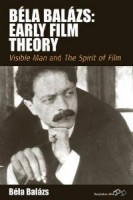kategóriák
- Közlekedés ajánlójegyzék
- Szocreál ajánlójegyzék
- Reklám ajánlójegyzék
- Fotó ajánlójegyzék
- Kínai-japán ajánlójegyzék
- Szentkép ajánlójegyzék
Új árakkal! - Új szentkép ajánlójegyzék II.
- 12 érdekes régiség
 Könyv
Könyv
 Bibliofilia
Bibliofilia
 Régiség
Régiség
 Metszet
Metszet
 Térkép
Térkép
 Fotó
Fotó
 Papírrégiség, Aprónyomtatvány
Papírrégiség, Aprónyomtatvány
 Plakát
Plakát
- Cirkusz
- Modern grafika
- Szocreál
- NER Irodalom
- Egyéb
kosár
üres a kosár
nincs bejelentkezve
Balázs Béla : Earley Film Theory
- leírás
- további adatok
Visible Man and The Spirit of the Film
[The book is] part of the Film Europa: German Cinema in an International Context series. [It] has an attractive typeface and a well-designed layout. In addition to Carter's introduction there is also a useful Glossary of terms and an Appendix with two reviews... In all, this book is a very good introduction to Balázs' film philosophy and a long overdue entry into the English-speaking world of film literature. · Screening the Past An exemplary book in every way, this translation makes Balázs' revolutionary texts available in English for the first time ... Dating from 1924 and 1930 respectively, The Visible Man and The Spirit of Film had a decisive influence on such major Russian filmmakers as Vsevolod Pudovkin and Sergei Eisenstein, and were among the first studies to examine filmic syntax, grammar, and editorial structure. Including a detailed introduction and numerous illustrations, this volume is a must for anyone serious about film ... Highly recommended. · Choice Béla Balázs's two works, Visible Man (1924) and The Spirit of Film (1930), are published here for the first time in full English translation. The essays offer the reader an insight into the work of a film theorist whose German-language publications have been hitherto unavailable to the film studies audience in the English-speaking world. Balázs's detailed analyses of the close-up, the shot and montage are illuminating both as applicable models for film analysis, and as historical documents of his key contribution - such contemporaries as Arnheim, Kracauer and Benjamin - to critical debate on film in the 'golden age' of the Weimar silents.
[The book is] part of the Film Europa: German Cinema in an International Context series. [It] has an attractive typeface and a well-designed layout. In addition to Carter's introduction there is also a useful Glossary of terms and an Appendix with two reviews... In all, this book is a very good introduction to Balázs' film philosophy and a long overdue entry into the English-speaking world of film literature. · Screening the Past An exemplary book in every way, this translation makes Balázs' revolutionary texts available in English for the first time ... Dating from 1924 and 1930 respectively, The Visible Man and The Spirit of Film had a decisive influence on such major Russian filmmakers as Vsevolod Pudovkin and Sergei Eisenstein, and were among the first studies to examine filmic syntax, grammar, and editorial structure. Including a detailed introduction and numerous illustrations, this volume is a must for anyone serious about film ... Highly recommended. · Choice Béla Balázs's two works, Visible Man (1924) and The Spirit of Film (1930), are published here for the first time in full English translation. The essays offer the reader an insight into the work of a film theorist whose German-language publications have been hitherto unavailable to the film studies audience in the English-speaking world. Balázs's detailed analyses of the close-up, the shot and montage are illuminating both as applicable models for film analysis, and as historical documents of his key contribution - such contemporaries as Arnheim, Kracauer and Benjamin - to critical debate on film in the 'golden age' of the Weimar silents.
| állapot: |      |
| kategória: | Könyv > Idegennyelvű könyvek > Angol nyelvű > |
| kategória: | Könyv > Művészet > Film, Színház > |
| kiadó: | Berghahn Books, 2010 |
| cikkszám / ISBN: | 9780857453556 |
| kötés: | fűzve |
| oldalszám: | 258 |
| könyv nyelve: | angol |

























































 Telefon:
Telefon: E-mail:
E-mail:







